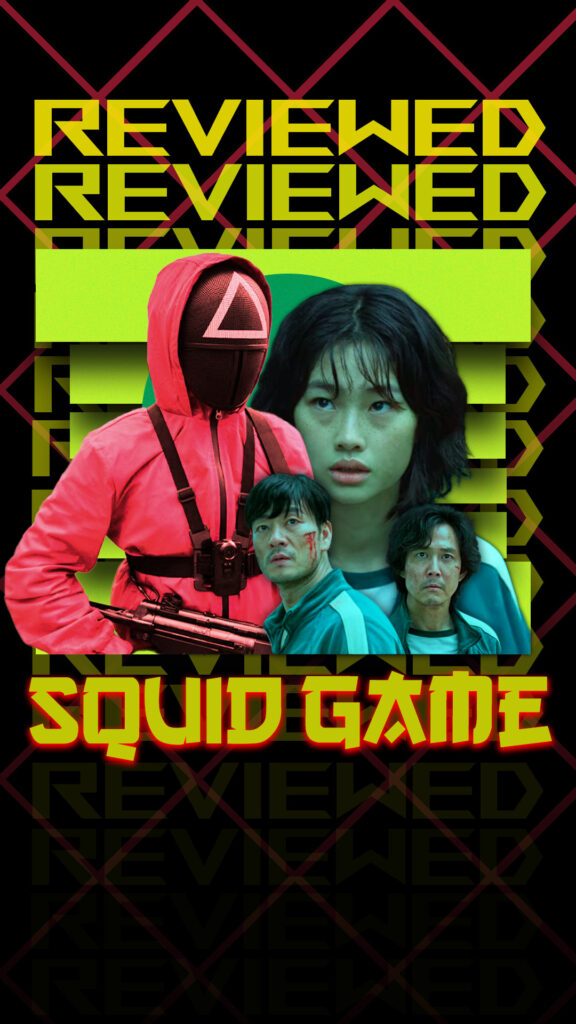
Spoiler Alert: The following review contains spoilers from the show Squid Game.
Sir, would you like to play a game with me?
The dystopian drama and Netflix original, Squid Game, has gained a lot of global traction to become one of the most-watched series on the platform in a short span of being streamed. The show has garnered over 111 million views since its debut on September 17, 2021.
Created, written and directed by Hwang Dong-hyuk, the show’s idea was conceived and developed in 2009 to disseminate Hwang’s own pecuniary problems. The creator’s idea of an allegory of the contemporary competitive capitalistic society is well executed. It took Hwang his free time after work and nearly a decade to come up with this refreshing take on survival games where human lives are at stake. Each episode revolves around a childhood game with simple rules that pave the way for individual character development and detailed subplots tackling issues faced in South Korea. The thematic choice of the nine-hour long series is one of the reasons for the show’s global critical acclaim, besides the social metaphors and enthralling scenarios that dictate its premise.
Korean cinema often takes its inspiration from local issues. However, with the disturbing reality we all live in, the population and economic problems we face as a society are universal. With the disconcerting events and mass death in this decade, we’re able to grasp the dispensability of human lives. With media like Hunger Games, Divergent set in an evidently futuristic time with more autocratic parties/people in power, Squid Game’s era is ambiguous as the government and societal vices in power possess an uncanny semblance to real life. As a survival game, it focused equally on the ruthless system as well as its victims, quite similar to the gladiator games during the pinnacle of inequity and inequality of the Roman empire. The players of the game are carefully chosen individuals in economic crises; with their family’s lives in dire straits, they are compelled to play the game and try to win against all odds. Often with series or films dealing with heavy topics, the characters rarely interfere with the plot as the setting and situation decide their fate.
The Characters
The show follows seven main characters whose primary motivator is to dodge death and debt in the ruthless rat race of life. Isolated, in the setting of the game with high stakes for apparent greater chances of winning, they choose to escape their mundane lives to try their luck.
Seong Gi-Hun
We first see the game from the perspective of the protagonist, Seong Gi-Hun, a laid-off employee with crippling gambling habits and loan sharks after his life. His motivators in life are very materialistic due to lack of money and a job. Gi-Hun is described as a sacked ex-employee of Dragon Motors. He lives with his aged mother and fails to be a good father to his daughter. Gi-Hun is depicted as a gullible character as he falls prey to trickery and is unable to be cold and calculated under extreme circumstances. Time and again in the show, he places the value of human lives over the 45.6 billion won. His trust in people prevails at the end along with the message of humanity that mirrors the cries of the laid-off Ssangyong motors workers, “Let’s live together.”
Cho Sang-Woo
Cho Sang-Woo is a first-generation graduate who is the pride and joy of his mother and hometown alike. He also happens to be our protagonist’s childhood friend. Sang-Woo’s bespectacled face and stoic nature exude his knowledge and education. A small town graduate overburdened by the pressure of pending student loans, he tries his luck at every opportunity to make risky decisions for greater returns. Despite his cold and calculative character, he manages to find allies on the battlefield of Squid Game, whom he deceives until the futility of his life flashes before his eyes in the end. He remains to be the voice of reason through the turmoils the team faces, often making tough and calculated decisions without consulting his humanity.
Kang Sae-Byeok
Kang Sae-Byeok is a North Korean refugee and survived by her younger brother. Her connection to Gi-Hun is established when she tries to pickpocket him. A self-reliant character in the series whose relentless efforts to reunite her family from North Korea and her brother’s happiness are her main motivators in life. Although she is very wary of people, she eventually starts to trust a few of her teammates in the game with limited apprehension. Her position in the game is earned, unlike a few others piggybacking on the strategy and pure luck of the game, albeit her death is a poignant moment in the show. She forms a connection with fellow player Ji-Yeong and the duo bond through their shared childhood trauma.
Hwang Jun-Ho
Hwang Jun-ho is a clever detective whose quick thinking exposes the morbidity of the games. He goes to great lengths to find his brother’s whereabouts, to the extent of disguising himself as a pink soldier in the games. The brotherly bond is strengthened through the entirety of the series and leaves the viewers appalled when his brother is revealed to be the Frontman of the game. Jun-ho’s detective and investigative skills surpass that of his peers, who represent the idyllic role the police plays in protecting citizens. The details of the game’s inner workings are presented to the audience as part of Jun-ho’s invigorating investigation, keeping them hooked till the end.
Abdul Ali
A new aspect of the wealth gap and inequality in society is shown through the problems of immigrants in the world. The Pakistani worker, Abdul Ali’s problems portray the deceit of employers who hire immigrants with promises of a brighter, better future away from home only to be unpaid workers in a foreign country with no way out. A gullible and trusting individual, Ali is one of the most compassionate characters in the show. He is immensely grateful for the small acts of kindness he receives from others and goes out of his way to help them. His unending trust in Sang-Woo, who he considers an older brother figure, leads to his ultimate demise through deception.
Oh Il-Nam
The player 001, Oh Il-Nam plays a vital role in the game. An old, diseased and dying man, he’s seen focused in the games, playing to live vicariously through memories of his youth encrypted in the game. His character is accurately depicted, despite being the creator of the game he is seen helpless at the face of his old age, debilitating dementia and brain tumour—with symptoms of loss of bladder control and memory loss. The entire length of the series is peppered with instances that foreshadow the fact that he is the creator of the game. His aim to create morbid entertainment for the wealthy audience of the game makes the viewers lose any sympathy they initially felt for him. He strongly insists on the absence of humanity as he depicts it, his final conversation with Gi-Hun is insightful as he represents the mindless decisions made by the aristocrats of society.
Han Mi-Nyeo
Han Mi-Nyeo’s character is one that viewers either pity or are humoured by. Her initial impression is that of a helpless woman looking to fit in and survive. A victim of her own habits and actions, Mi-Nyeo’s dramatic response at turbulent moments in the game truly depicts how alone she is in the game. She is deceived time and again by fellow player Jang Deok-Su and remains true to her words as she paves the way for a poetic ending of the duo that remains together till the end.
Red Light, Green Light and Set Lights
Both the soldiers in pink and the players in green tracksuits create an antipodal aspect to the show’s visuals. As designed by the makers, the system of the show strives to create a level playing field for all the 456 participants. However, instating the pink soldiers with some power corrupts them, prompting them to profit off the corpses of the eliminated players. Greed trickles through all strata of the game—from its conception, the game is a source of entertainment and human drama for the ultra-rich of society who are not satisfied with conventional media.
The architecture of the set is minimalistic, with hints of spatial oppression peppered through the set design of this faraway game island. Kidnapped, sedated and transported to an industrial warehouse, the 456 beds in the large dormitory are arranged as a gradual terrace to mimic the constant competition to ascend the ladder. The shelving design of the beds reduces the players to objects that are stored in warehouses. The pathways to the game arenas follow an extremely colourful block design, with the games themselves being bright and vivid to imitate real playgrounds and childhood. In contrast, the dormitory is colourless and dull. At night, the only light available is from the glowing piggy bank counting the money they’ve earned thus far, attracting their attention to it every waking hour.
Uncertainty adds to the allure of labyrinths. The fundamental aim of these places is to perplex and disorient. This delicate yet sterile construction with repeating parts perplexes not just the observer, but also the participants, who are obliged to line up and mount each step of the staircase as if it were the last.
Squid Game is no different from reality. It mimics society and its rigid structure, stubborn rules set by fickle-minded authoritarians at power. The game is a high-paced high-risk take on the global rat race. The odds are raised extremely high without evaluating the cost of lives involved. The corruption of the game, with soldiers allying with the doctor to make a quick buck from all the corpses in the game, is similar to the corruption present in the society we live in today. Albeit the rules of the game and society alike are carefully considered to ensure that all are at par with each other in the race, age, familial background, class, creed, nationality and religious value into the equation of success. In the game, player 001 is severely disadvantaged due to his age but is shown no mercy by the authority figures of the game.
It is difficult to take your eyes away from the screen as in the pandemonium of the post-pandemic world, differences take exaggerated effects on the disadvantages of society. It does not seem like a far cry to assume or anticipate this sort of game as a reality in different countries.
Written by Shirley Asangi for MTTN
Edited by Anika Shukla for MTTN
Featured Image by Skanda Annadana for MTTN
Images via Google Images


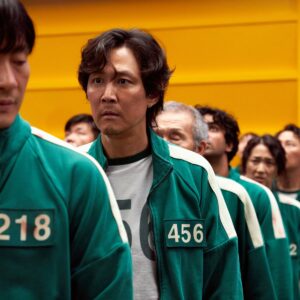
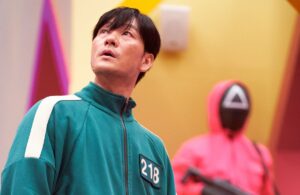
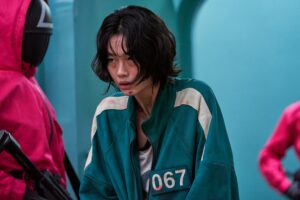
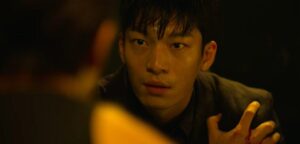
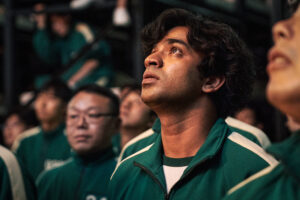
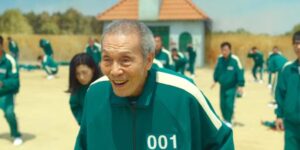

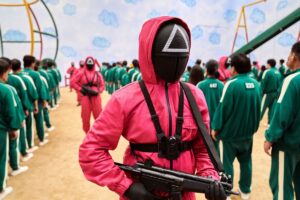
Leave a Reply
You must be logged in to post a comment.